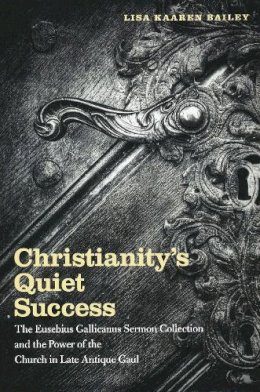10%OFF
Stock image for illustration purposes only - book cover, edition or condition may vary.
Christianity's Quiet Success: The Eusebius Gallicanus Sermon Collection and the Power of the Church in Late Antique Gaul
Lisa Bailey
FREE Delivery in Ireland
Description for Christianity's Quiet Success: The Eusebius Gallicanus Sermon Collection and the Power of the Church in Late Antique Gaul
Paperback. Num Pages: 272 pages. BIC Classification: HRCC1; HRCC7; HRCP. Category: (G) General (US: Trade). Dimension: 229 x 150 x 20. Weight in Grams: 431.
Lisa Kaaren Bailey's Christianity's Quiet Success: The Eusebius Gallicanus Sermon Collection and the Power of the Church in Late Antique Gaul is the first major study of the Eusebius Gallicanus collection of anonymous, multi-authored sermons from fifth- and sixth-century Gaul. Bailey sheds new light on these sermons, which were strikingly popular and influential from late antiquity to the High Middle Ages, as the large number of surviving manuscripts attests. They were used for centuries by clergy as a preaching guide and by monks and pious lay people as devotional reading.
Bailey's analysis demonstrates the extent to which these stylistically ... Read moresimple and straightforward sermons emphasize consensus, harmony, and mutuality as the central values of a congregation. Preachers encouraged tolerance among their congregants and promoted a model of leadership that placed themselves at the center of the community rather than above it. These sermons make clear the delicate balancing act required of late antique and early medieval pastors as they attempted to explain the Christian faith and also maintain the clerical control considered necessary for a universal church. The Eusebius Gallicanus collection gives us fresh insight into the process by which the Catholic Church influenced the lives of Western Europeans.
Show Less
Product Details
Publisher
University of Notre Dame Press
Place of Publication
Notre Dame IN, United States
Shipping Time
Usually ships in 7 to 11 working days
About Lisa Bailey
Lisa Kaaren Bailey is a senior lecturer in the Departments of Classics and Ancient History and of History at the University of Auckland.
Reviews for Christianity's Quiet Success: The Eusebius Gallicanus Sermon Collection and the Power of the Church in Late Antique Gaul
“This is a model study. With a deft survey of the evidence and an eye for telling detail, Lisa Bailey has substantially added to our understanding of preaching, modes of persuasion, and everyday religious practice in late antique Gaul. Sins and sinners, problems of faith, the troubling facts of injustice, the shared work of salvation—all are illuminated in this penetrating ... Read moreanalysis.” —William E. Klingshirn, The Catholic University of America "A thorough study of the Eusebius Gallicanus collection was long due, in particular a study that is not focused only on the question of authorship. Lisa Bailey convincingly shows that the collection was made for the average Gallic preacher and that it can therefore provide a picture of late antique Christianity that significantly differs from the one we get through the sermons of figures like Augustine or Caesarius of Arles." —Eric Rebillard, Cornell University “This book . . . concerns an ancient collection of sermons called Eusebius Gallicanus. It consists of 76 sermons, written in southern France in the late fifth century, and probably collected into a homiliary in the sixth.” —American Benedictine Review “The Eusebius Gallicanus collection of sermons . . . has received comparatively little scholarly attention, being comprehensively overshadowed by the sermons of Caesarius of Aries. Bailey’s monograph . . . aims to show why this collection is worthy of wider consideration and how it brings important new insights to our understanding of the process of Christianization in late antique Gaul.” —Bryn Mawr Classical Review “Debates on authorship and historical context have hindered closer analysis of the sermons themselves and of the nature and purpose of the collection. Christianity’s Quiet Success is therefore all the more welcome. In this valuable book Bailey reassesses the importance of the Eusebius Gallicanus sermons and their contribution to the emergence of western Christendom.” —Journal of Theological Studies “Bailey reveals that it is a collection of texts that was pivotal in allowing the church to centralize its authority and impose uniformity in a social milieu that otherwise lacked such powerful totalizing discourse. Bailey can be credited for single-handedly bringing this sermon collection out from the depths of the footnote to the front page. Perhaps one of the greatest implications of this important study is that it makes it abundantly clear that an English translation of the sermon collection is vitally necessary.” —Religious Studies Review “Lisa Kaaren Bailey has written an important work. . . .In detailing distinct local pastoral strategies within the strategies advanced by episcopal authority, Bailey has revealed the need to reinterpret not only the role of the early Church in the community, but also the role of episcopal authority in managing these communities.” —Parergon “Bailey’s book convincingly argues that the largely anonymous, low-key sermons of [Eusebius Gallicanus’ sermon collection] are an indispensable counterpoint to the idea that the success of the Church in the West is due to the rise of powerful bishops. The ‘quiet success’ referred to in the title is the result of patient community building by ordinary pastors.” —Vigilae Christianae “Bailey . . . conducts an extensive examination of the text’s contents, thereby providing broader context and enabling greater accuracy for an understanding of preaching and receiving the Christian message in Gaul.” —Church History “Simply by providing an exposition of such an important, but hitherto almost ignored, collection of texts, Bailey has provided a service to scholarship. However, her analysis of the sermons and of what they imply about Gallic Christianity, both in secular and monastic settings, is extremely convincing throughout. Her work is a significant expansion of our knowledge of Christianity in late-antique Gaul.” —The Catholic Historical Review Show Less


